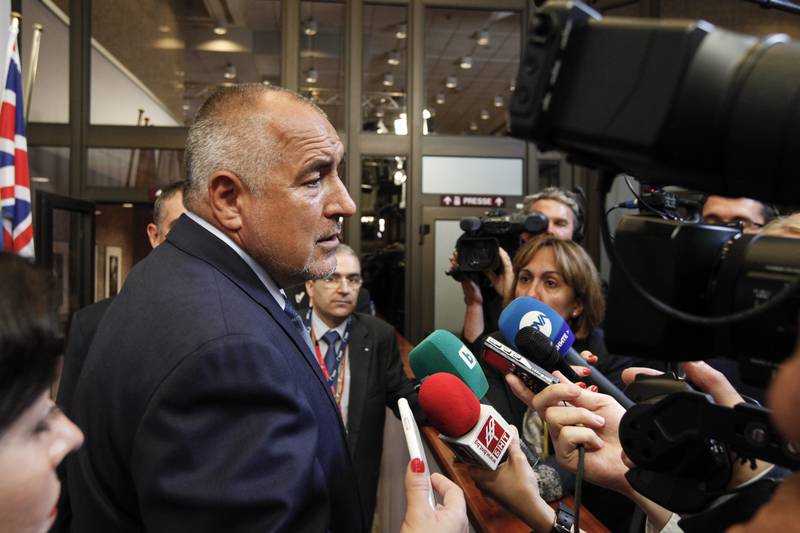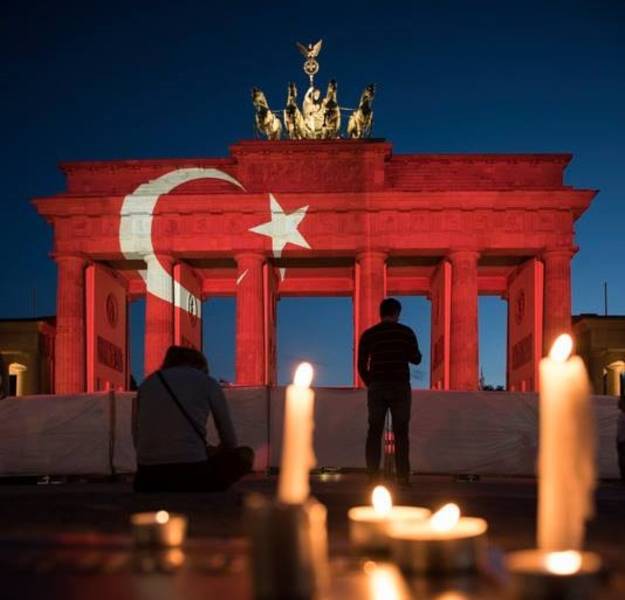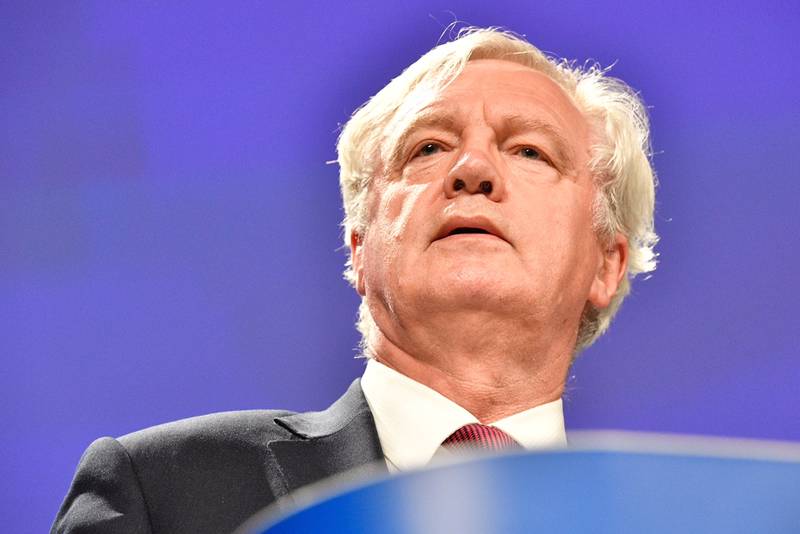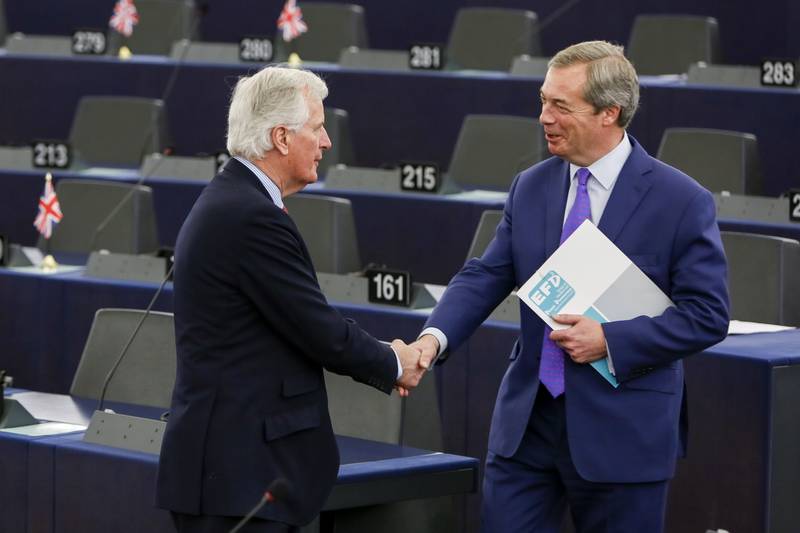Chronicle of the June European Council
Adelina Marini, July 7, 2016
 The June EU summit came and went. All has now been reported, read, forgotten. Gazes are fixed on the upcoming NATO summit and a bunch of other important subjects, some of which will have a short Tweet-life, others will make the headlines, third will be subject of analysis and comments by experts and analysts, and fourth will become a leading subject for the Facebook community. And yet – is it possible that we have missed something from the atmosphere of the June 28-29 summit? Or is anything worth recalling again? I would single out several things that caught my attention. Some of them got covered in European media, others – perhaps not, third I shared on Twitter and Facebook with the respective consequences :)
The June EU summit came and went. All has now been reported, read, forgotten. Gazes are fixed on the upcoming NATO summit and a bunch of other important subjects, some of which will have a short Tweet-life, others will make the headlines, third will be subject of analysis and comments by experts and analysts, and fourth will become a leading subject for the Facebook community. And yet – is it possible that we have missed something from the atmosphere of the June 28-29 summit? Or is anything worth recalling again? I would single out several things that caught my attention. Some of them got covered in European media, others – perhaps not, third I shared on Twitter and Facebook with the respective consequences :)
Juncker reads Polish literature in German and Borissov did not read just “Winnetou”
The former Prime Minister of Luxembourg and current head of the European Commission, Jean-Claude Juncker, is famous for his sharp tongue and specific sense of humour. Ever since he headed the Commission, however, his sharp remarks decreased considerably. Whether happy with the Brexit or just by coincidence, Mr Juncker returned to his former sharpness. During the press conference after the first day of the summit, a bit past midnight of June 28, while presenting the results of the discussions with the British prime minister, the following episode played out between him, European Council President Donald Tusk (Poland, EPP), and Dutch PM Mark Rutte, who was there to report on the results of the 6-month Dutch presidency:
"Juncker: When it comes to the UK I will have to express myself in English, because I was noting today [June 28] that spokesperson of the EC wasn’t using the language of Shakespeare. This was a major mistake but I was not.... (he gets interrupted by illegible remarks by Tusk and Rutte). Yeah, but I'm the only one who cannot talk in his native language because you don’t understand Luxembourgish, which is a major mistake (laughter).
Tusk: What about Polish?
Rutte: It's a loss for the whole Europe, Jean-Claude.
Juncker: My Polish is, how to say, as approximately as the language knowledge of others and different languages. I like the Polish literature but I'm reading it in German (a moment of complete silence in the room for several seconds and a slightly bewildered look on the face of former Polish PM Donald Tusk)”.
While Juncker is reading in German, explaining it in the language of Shakespeare, the Bulgarian prime minister shattered the myths that he had read just “Winnetou”. After I asked him which stream in the EU does he support – whether that of a more flexible Union, or a looser one he replied:
"Back in the day there were those books – I don’t know if you have read them – on utopian Socialism – Thomas More, Tommaso Campanella, about The City of the Sun – how all will be nice, flat, golden, magnificent, but it failed to incarnate anywhere in the world ".
Sweet media revenge
Following Brexit hundreds of analyses and commentaries pointed at British media as the main culprit for the result. There was a research published in April, done by the Zьrich-based analytic company Media Tenor, according to which the public British corporation BBC has spoken more negatively of the EU than of Russian President Vladimir Putin. Over the last 15 years coverage of the EU were far more negative, than positive. During the presentation of the survey in Brussels, analysts from Media Tenor stated that British TV stations, BBC in particular, failed to present a balanced view on the EU or sufficient coverage of how the EU affects the United Kingdom.
The British media army in Brussels is not among the European institutions’ favourites, but the Brexit unleashed some long kept feelings. Some of them funny. For example the dialogue between the BBC Brussels correspondent Chris Morris and the Dutch PM Mark Rutte:
"Morris: One extra question specifically for PM Rutte. You said on your way in that England has collapsed politically, monetarily, constitutionally and economically. What do you think we've got left?
Rutte, Juncker, and Tusk reply almost simultaneously: The BBC (laughter)".
The same journalist found it not as funny during his conversation with a senior EU official, whose identity I am not at liberty to share, for the conversation was informal. I did not hear the question well, but the retort was sharp. It started with thorough, but dry explanations of legal procedures that are pending in order for the Brexit to come in force. They were followed by detailed explanation of the circumstances that led to the referendum with a reminder that Great Britain got even more than the EU was capable of. At the end, the journalist was literally hissed at not to seek blame in the EU. At this very moment nobody wished they were in the British colleague’s shoes.
A strange request for Jean-Claude Juncker’s resignation
During the two-day summit surprisingly appeared a request for the resignation of the EC boss. This was also mentioned even before the European Council, but the situation looked a lot like campaigning. Most involved in the subject were two large European media – Euractiv and Politico Europe. At each public event they asked about Juncker’s resignation. It later became clear that Poland was behind the request. The official reason was that Juncker overstepped good manners with his reactions to the Brexit. There were speculations in Brussels, however, that Warsaw’s ulterior motive was getting rid of Juncker, who ordered the start of a procedure against Poland for the protection of rule of law.
 Juncker received serious support in the European Parliament, where he himself refuted the claim that his resignation was pending due to his poor health: “I am neither tired nor ill, as some German papers claim — apparently today's doctors work in journalism. I am who I am, and until my last breath I shall fight for a united Europe for, a better Europe”, he assured MEPs. Backing Juncker were the PMs of Hungary and Bulgaria – Viktor Orbán and Boyko Borissov. They both stated that now is not the time to shake the EC. The European Parliament also supported Juncker and encouraged him to stay at a background of German ministers’ statements that it is best he be replaced.
Juncker received serious support in the European Parliament, where he himself refuted the claim that his resignation was pending due to his poor health: “I am neither tired nor ill, as some German papers claim — apparently today's doctors work in journalism. I am who I am, and until my last breath I shall fight for a united Europe for, a better Europe”, he assured MEPs. Backing Juncker were the PMs of Hungary and Bulgaria – Viktor Orbán and Boyko Borissov. They both stated that now is not the time to shake the EC. The European Parliament also supported Juncker and encouraged him to stay at a background of German ministers’ statements that it is best he be replaced.
Germany has other interests regarding Juncker. Berlin, same as quite a few other member states, disliked the new procedure for the election of the EC boss using European political parties’ nominations and presenting the nominees during the European Parliament elections The procedure became known by its ... German name Spitzenkandidaten. It was a large victory for the European Parliament and its main purpose was to answer criticism about a democratic deficit in the EU. Right after struggling to swallow the procedure, Germany had to face Juncker’s decision to make a political body of the Commission, which Berlin strongly disagrees with. Most calls for removing the Spitzenkandidaten procedure are coming exactly from Germany.
If Juncker for some reason does resign, it is highly probable that his successor will be elected the good old way, which, keeping the Brexit in mind, would be a very large mistake, for a considerable portion of Eurosceptics blame the EU for often making important decisions based on behind-the-scene deals. The issue remains open as of now. Several media expect Juncker’s head to roll next year. The European veteran, however, has so far always demonstrated enviable survival instinct and if his health does not stop him, he will surely resist any attempts to be dethroned, and he has the European Parliament majority backing him.
Some journalists are preferable
I bring you back to the media subject, because during the first press conference in Brussels I noticed something, which may not seem important to you, but is a symptom. Hosting press conferences after meetings of the European Council is President Tusk and thus his spokesperson, Preben Aamann from Denmark, has the task of pointing out which of the many eager journalists will ask a question. However, at the end of the midnight press conference on June 28th Jean-Claude Juncker was adamant that a specific journalist asks him a question. Juncker was pointing a finger and demanded that the correspondent of the Italian Sky Tg24 television Giovanna Pancheri asked him a question and Preben Aamann agreed. She asked about the request of Italian PM Matteo Renzi to save failing Italian banks with public funds, which is against the EU state aid rules and undermines the just-assembled banking union, which is yet to be tested to see how it works.
It is probable that Mr Juncker insisted that it is exactly Giovanna Pancheri that asks him a question, for he wanted to send a clear message to Matteo Renzi. “Knowing that you are Italian I don’t want to respond immediately and pro-actively to your question. We were discussing the matter together with Matteo Renzi this afternoon. The Commission will do everything in order to avoid any kind of bank run. This is not a danger for Italy for the time being but we have to make sure given the uncomfortable global circumstances, that we're in, that the banking sector in Italy and elsewhere will be protected in the best way possible”. The subject is very important to Italy, whose banking sector did not get money poured in as was done in other countries in the beginning of the euro area crisis back in 2009.
At the moment, the number 40 billion euro is being circulated in media as a potential bailout for Italian banks, which are full of non-performing loans to the amount of 360 billion euro. According to many analysts, Italy’s banking sector is not in this condition because of the Brexit at all. Something PM Renzi himself admits, reminding however that banks were not saved when it was necessary. Such was the decision of the PM at the time Silvio Berlusconi, he stressed. A strong opponent to Matteo Renzi’s attempts to push through any new compromises with rules is, as is to be expected, German Chancellor Angela Merkel, who stated at a briefing with German journalists in Brussels that it is important to Germany that the banking union is working. “We are also particularly looking at the Banking Union, we work on seeing to it that certain rules and regulations are put in place on the resolution of banks, on recapitalisation and we cannot, after all, every two years change it again and put new agenda”, she stated.
Matteo Renzi replied indirectly at his press conference with Italian journalists in the afternoon of June 29, reminding that it was exactly Germany and France who first broke the budget deficit rules and that Germany paid 247 billion euro to save its banks. Italy does not want a change of rules, he stressed repeatedly.
A matter of priorities

Another detail, which is worth mentioning is the reaction of leaders to the news of the bloody terrorist attack at the Istanbul “Ataturk” airport that same evening, when leaders were supposed to be listening to David Cameron’s explanations about the Brexit. The terrorist attack claimed the lives of over 40 people and 230 more were wounded. At his national briefing, Prime Minister David Cameron did not say a word about the tragedy. Those were, however, German Chancellor Angela Merkel’s first words: “We, all heads of state and government, as we assured one another, shocked and dismayed by this new act of terrorism. Over the past few months Turkey has time and again been attacked. It has been a horrific series of attacks against Turkey. We don't know as of yet who are the perpetrators. Our deepest sympathy goes to the victims of those attacks. I'd like to assure the Turkish people that we stand by their side”, said Mrs Merkel, and her words were complemented by the light depicting the Turkish flag on the Brandenburg Gate in Berlin.
French President François Hollande also began with the terrorist attack. He takes the terrorism subject to heart. He condemned the attack and urged to action. His condolences to the Turkish government and people were the only things the Italian PM said upon exiting the summit late at night. The Irish prime minister also started his press conference expressing shock and sadness by the attack at the Istanbul airport. Support for Turkey in such a critical time was widespread on the continent.
From the “hits only” collection of the Bulgarian prime minister
What we have for a prime minister managed to startle the entire journalist army in Brussels, who were praying that this year their summer vacation will not be interrupted by emergency summits. A drama unfolded after the PM announced for Bulgarian journalists that an extraordinary European Council is scheduled for July. In our business, speed is essential and although Bulgaria is a different case, one always rushes to breathe life into the piece of news by shooting it out on Twitter first. This is exactly what I did. It turned out that in less than five minutes the Brussels colleagues set the phone of the Bulgarian permanent representation in Brussels on fire, demanding clarification. It turned out the Bulgarian PM made a lapse. It happens, you might say. True, but it happens more often to some of us. :)
If it was just this lapse, we could happily live with it, but the PM made several more, which shows more serious problems. It is not a big deal if you get a date wrong, for many dates were circulated in those days, but not knowing which prime minister belongs to which country and where the country is located is embarrassing and leads to blushing. Following are two of the statements, causing bewilderment:
“I now listened to Kenny and other colleagues from Great Britain. The nation, broadly speaking, at the moment is not the United Kingdom, but the Divided Kingdom, because many young people, in particular, want to stay in Brussels, thus, so to speak, a road for Great Britain to return to the European Championship is lacking, in football, after Iceland ... (laughter) On the other thing, I think that when the initial emotion passes for everyone a good solution can be found.” There is hardly a need of a cross section analysis to point out what is wrong with this statement. I will  just say word is of Enda Kenny, the prime minister of the Republic of Ireland, which has not been part of Great Britain since the beginning of last century.
just say word is of Enda Kenny, the prime minister of the Republic of Ireland, which has not been part of Great Britain since the beginning of last century.
The other statement is regarding the Istanbul terrorist attack: "While these wars are waged and people are put under bombardment and having no choice what will be the rocket – whether American, French, Russian, Turkish – that will kill them, this is what the present will be” ... So, choose your rockets while you still can. I will see you at the next European Council on September 16 in Bratislava before it becomes “interesting” as the PM said regarding the upcoming presidential elections. They, he said, are his biggest concern. Well, what can we say, it has been interesting for us for ... how many years?
Translated by Stanimir Stoev
 David Davis | © European Commission
David Davis | © European Commission Angela Merkel | © Council of the EU
Angela Merkel | © Council of the EU Michel Barnier, Nigel Farage | © European Parliament
Michel Barnier, Nigel Farage | © European Parliament